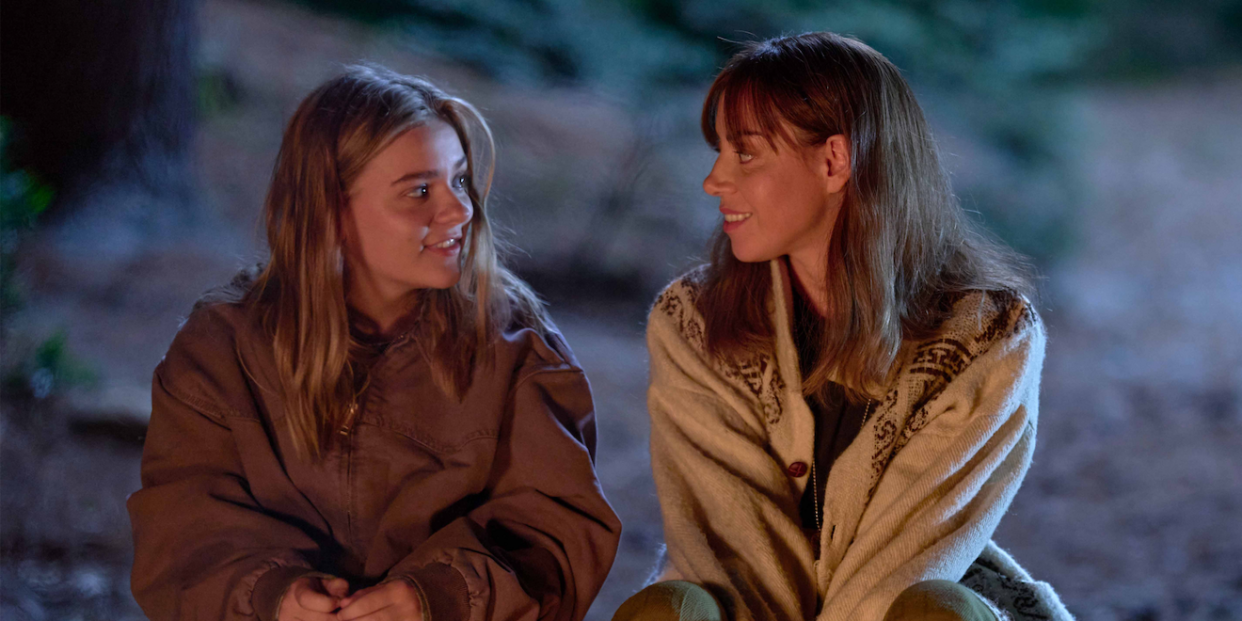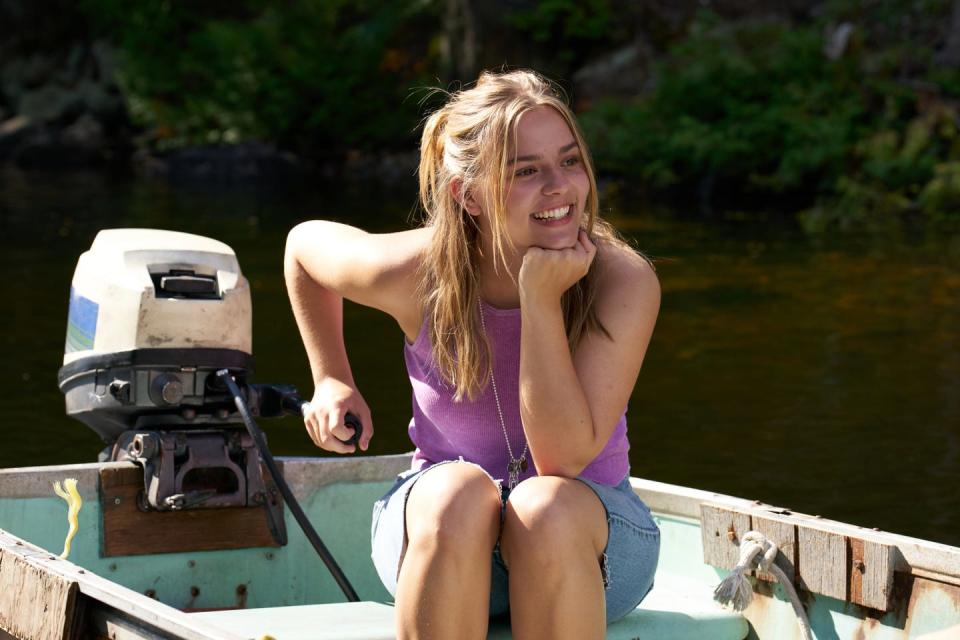My Old Ass: ‘Finally, a bisexual film I can relate to’

The teen coming-of-age genre has come a long way. Now, it’s not just the trials and tribulations of exams and finding a prom date: it’s also opening up fresh — and very *now* — ways of discussing all the beautiful forms that queerness can take.
At least that’s the case with My Old Ass. The Booksmart-meets-Back to the Future rom-com starring Aubrey Plaza (praise be) and Maisy Stella (who appears to be in an adorable relationship with Bella Ramsey) is, well, just as incredible as you’d expect from a movie with that elevator pitch.
It follows lesbian Elliot (Stella) in her last summer before college as she’s finally hooked up with the girl of her dreams. But it all takes an unexpected turn after a mushroom trip that brings her face to face with her 39-year-old self (Plaza). Older Elliot’s advice? Stay away from some guy called Chad.
But, as it turns out, Chad is going to be pretty hard to avoid: once the trip has subsided, Elliot discovers that her dad’s latest farmhand is called *drumroll* Chad. Cue: plenty of questioning as Elliot develops feelings for Chad and eventually has her first sexual experience with a cis guy — ultimately realising that her sexuality is more fluid than she first thought.
Watching this story pan out, I couldn’t help but feel gratitude to the director-writer Megan Park for bringing a bisexual story I could relate to onto the big screen.
See, bisexuality is considered to be something of a gateway drug: like a little red pill that will transport you into the world of queerness and same-sex attraction, before you swear off opposite-sex dating altogether. Or, as Carrie so scathingly put it in SATC 20-something years ago: “I’m not even sure bisexuality exists, I think it’s just a layover on the way to Gay Town.” But that’s not everyone’s experience — it’s certainly not mine.
In fact, in my case it was a lesbian identity that would eventually help me come to terms with my bi-ness. After first recognising my same-sex attraction from the age of eight, I always knew I was drawn to women and thought that my teenage relationships with boys were (mostly) to pass the time until I gained access to the big, gay world of university. But then, nine years after coming out as a lesbian, I met a man at work who’d ultimately wind up being my next boyfriend — but while I knew I loved him, I couldn’t help but feel guilt about giving up on a label that had served me so well for so long.
This is a similar experience to Quinn, a 26-year-old trans guy who recalls that, before exploring his gender, he “briefly identified as a lesbian before realising I might also be into men”. Some of his early sexual experiences consisted of solo play revolving around fantasies involving women. From there, he discovered what arousal and attraction felt like in his body and “couldn’t deny [he] was also into some men”.
While he doesn’t recall any negativity from the queer community upon defining as bi, he did feel internalised guilt around his new label — something that only let up once he was able to contextualise his gender and how that impacted his sexuality. “I felt I was somehow ‘less queer’ or ‘less feminist’ because I was bi,” he recalls. “However, realising I’m actually a trans guy and stepping into my gender helped make sense of this. Regardless of who I’m dating or having sex with, I’m a bisexual guy, and that helped me stop doubting my own queerness.”
Elaine*, 28, defined as a lesbian when at university before meeting her ex-boyfriend — who she was then with for nine years. However, when she was in this relationship she felt stifled and perceived a friction from within queer circles. “When you’re in a heterosexual relationship and you’re bi, you do feel like you’re not going to be as accepted in the queer community, and there’s an uncomfortability in finding safe queer spaces for you. There’s also more stigma.”

These feelings of guilt and queer imposter syndrome are ones that I, and many bi folks can relate to. While plenty of LGBTQIA+ spaces are welcoming to queer people — regardless of the gender of their partner — it only takes one negative comment to reinforce the feeling that we somehow ‘don’t belong’ with our community.
And when we look at the scant media representation that depicts a lesbian-to-bisexual pipeline, you can see why we experience this internal conflict. Queer classics like Go Fish represent lesbians who have gone on to sleep with men as somehow ‘letting down the side’, whereas more contemporary offerings, like Desiree Akhavan’s series The Bisexual, foreground the impact of this community backlash on bi people themselves.
This is why My Old Ass is so significant. When Elliot opens up to her queer friend Ro about her attraction to Chad, she’s not met with disappointment — instead, she finds acceptance and is reassured that her bisexuality doesn’t make her any less queer.
I can only hope that the film inspires a new generation to embrace their sexual fluidity — in whatever form it takes — without shame or guilt, only pride.
You Might Also Like


